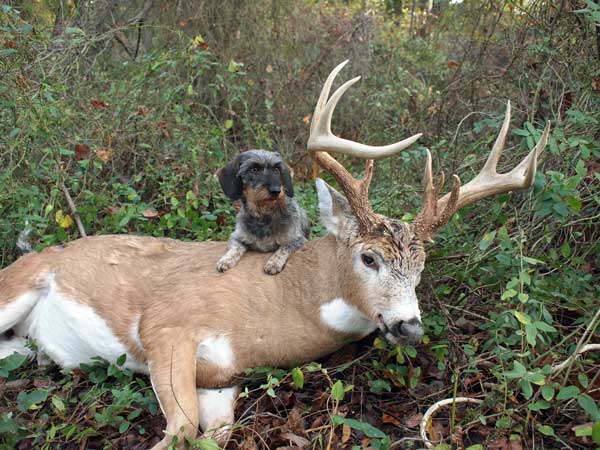LAST UPDATED: May 1st, 2015
Article contributed by Andy Bensing: President, United Blood Trackers
By now unless you have never read a hunting magazine or watched a hunting show on TV I would think every deer hunter has heard about the use of dogs to help them find a deer or other big game animal they have shot and been unable to recover on their own. But unfortunately even though there are many dogs and handlers with the ability to help in every state of the Union, the use of dogs to recover wounded big game is still not legal in all or part of 15 states.
Blood tracking dogs as they are typically called, even though they don’t need blood present to follow the trail of a wounded animal, have always been legal for use in many of the southern states. However around the beginning of the 20th century most of the rest of the United States outlawed the use of dogs in any way with deer hunting. This coincided with those states formalizing their game laws as state game agencies began regulating hunting activities. Over hunting of whitetail deer by market hunters using dogs to actually hunt, not just recover deer, is often cited as the cause of the ban.
The use of blood tracking dogs stayed illegal in all but a few southern states for the next 80 years or so until a movement for their use got started in New York in 1976. Once New York legalized the use of leashed tracking dogs for wounded deer recovery in 1985, six other states followed suit over the next few years but then things stayed quiet until about 10 years ago. In the last 10 years 20 more states, most recently Kansas just this past August 2014, have changed their laws and regulations to allow leashed tracking dogs to be used in big game recovery. As of the fall of 2014, 27 previously illegal states have now changed their laws bringing the national total to 37 states where a hunter now has this valuable resource.
So what’s wrong in the 15 non-legal states? What’s holding up legalization? Why are some deer , bear, and other big game animals that could easily be recovered with the use of a leashed dog going to waste in Arizona, Colorado, Connecticut, Iowa, Massachusetts, Minnesota, North Dakota, Nevada, Oklahoma, Oregon, Pennsylvania, Rhode Island, Washington, West Virginia and Wyoming ? There are many reasons for sure but after following the legalization efforts across the country and most specifically in my home state of Pennsylvania for the last 14 years, I believe the 2 major impediments to legalization in most states are ignorance and bad politics.
IGNORANCE is easily overcome. Here are the most common misconceptions about the use of leashed tracking dogs and their simple clarification.
Misconception 1. The use of leashed tracking dogs might lead to the illegal hunting of deer with dogs.
Clarification – Dogs that are used for hunting deer are unleashed and running free. None of the 27 states that have legalized the use of leashed tracking dogs have gone on to later legalize hunting deer off leash with dogs nor have they experienced a problem with illegal hunting of deer with a dog under the guise of tracking a wounded deer.
Misconception 2. The dogs will disturb other hunters.
Clarification – How disturbing is it to have a single dog on a leash walking through the forest with a dog handler and a hunter walking single file right behind him as he follows the footsteps the deer took earlier? Compare that to a single hunter or perhaps the hunter and 4 or 5 buddies grid searching the forest or field for hours when the blood trail disappears. Leashed tracking dogs almost never bark on the trail and the very small, less than 1% that do, only bark when they find the quarry at the end of the trail.
Misconception 3. There might be throngs of handlers using untrained dogs in the field.
Clarification – This has not ever been a problem in any state. Actually, the opposite is true. During the height of deer season trackers are the busiest and some hunters can’t be helped due to the lack of enough dogs to go around. The use of leashed tracking dogs is self-limiting in regards to untrained dogs and quite frankly poorly skilled handlers as well. Following a dog around on a leash through thick and thin and over hill and dale gets pretty uncomfortable pretty quick if the dog is not doing a good job and you are not finding anything. These trackers quit the sport quickly or get better training for themselves and their dogs. Hunters in a geographic area also figure out pretty quickly who are the capable teams and only call on the handlers with a successful reputation.
Misconception 4 – The dogs will chase healthy deer.
Clarification – First of all the dogs are on a leash so it is impossible for them to actually “ chase” a deer unless the dog’s handler is a world class cross country athlete. Putting that aside, much like the clarification for number 3 above, tracking the wrong healthy deer by mistake is self-limiting. The dogs are trained to follow the track of only the specific wounded deer they are originally put on. There is no reward at the end for the handler or dog if the wrong healthy deer is followed. A dog that is not good at staying on the correct deer is no fun for the dog’s handler and quickly is left at home for a dog that is better.
Misconception 5. The availability of tracking dogs will increase the amount of unethical shots hunters will take.
Clarification – Unethical hunters are taking those marginal shots right now and hoping for the best. Dogs are not going to change that. A hunter takes ethical shots or he doesn’t. In 14 years of handling blood tracking dogs I have spoken directly to over 1,000 hunters who have called me for help in locating a wounded animal. As they describe to me what has happened I can assure you that some of them describe what most hunters would consider an unethical shot but I have never once gotten the impression they took the shot because they knew if it went wrong a dog could help them out. Actually, when most tracking dog handlers speak to hunters who have taken poor shots, they take the opportunity to try and educate the hunters why they should not have taken the shot in the first place.
Misconception 6. Blood tracking dogs are just one more new gadget to take the challenge out of hunting and make it easier.
Clarification – Tracking dogs are not anything new. The use of dogs to recover wounded big game goes back 100’s of years to well before the middle ages from our traditional European hunting roots where is has always been the way. It is only in the last 100 years in just some parts of the United States where the tradition was lost. Restarting an old tradition is certainly not something new. Especially when some parts of the country never stopped.
Secondly, and most frustrating to me personally, POLITICS often rears its ugly head even after the common misconceptions have been addressed. Here are some typical examples of how politics can hold up legalization.
Wildlife law enforcement agencies within a state sometimes erroneously believe tracking dogs will somehow make their jobs more difficult and vigorously work in the political shadows to defeat it. Evidence to the contrary is often just ignored. Interestingly, no matter how the tracking regulations in each new legalized state have been written, leashed tracking dog programs have caused no problems for hunters or Law Enforcement in those states. There is no demonstrable down side to any leashed tracking dog program anywhere.
In some states, not even all of the sportsmen’s clubs who represent the hunters of the state get on board right away. They all have an agenda of items they want to accomplish. Legalization of leashed tracking dogs often starts out low on that list. They don’t want to waste any political “chips” they might have on the issue. I’ve even seen rifle hunting organizations initially against leashed tracking dogs because they perceived them as another advantage to archery hunters who get to hunt earlier in the year than they do. Crazy, isn’t it?
Then there is the State government politics. In the luckier states, only regulations directly controlled by the wildlife management agencies need to be changed. In those scenarios it typically only takes the convincing of a few key individuals to get the regulations changed but even here sometimes intradepartmental political conflicts can arise.
It is hard enough to change a bureaucratic regulation within a state but when an actual state law has to be changed, that process can get particularly difficult. I will use my own efforts for legalization in my home state of PA as a specific example but PA is not alone with this type of political problem. Myself and others have been diligently working for the past 14 years to legalize leashed tracking dogs in PA. We have had six Bills introduced over that time. Three of those Bills actually made it through the quagmire of the committee process and passed unanimously or within 1 or 2 votes of unanimously on the floor of the State House of Representatives. Five of those bills died in committee at the end of legislative session either in the House where they started or the in the Senate where they were not voted on. Our 6th Bill which was voted unanimously through the House of Representatives just last year appears to be headed for the same fate as the rest. It looks like it will die in the State Senate Game and Fisheries committee again this year even though we have the overwhelming support of the individual hunters in the state as well as the support of all the Major Sportsman’s Associations. Over the last 14 years we have sent countless letters and information packets to all the legislators. We have made presentations at committee meetings, phoned and met personally with all the Senators, Representative and their aides many times. We have done everything humanly possible to educate them and answer their questions. Yet after 14 years of effort our current bill , HB451, has been discussed in committee on 3 separate occasions in the last year and a half and still languishes in that committee without a vote due to what could only be called bad politics. It seems like it always boils down to one or two overly powerful, seniority entrenched politicians playing political football with our bill with little or no regard to what the vast majority of constituent hunters in the state desire.
Luckily hunters in 27 states have been able to overcome the above challenges and get leashed tracking dogs legalized in their state. These hunters have the obvious benefit of an additional tool to recover their game but more importantly they are demonstrating to the non-hunting public that hunters take all ethical means possible to retrieve game that has been shot. In today’s society our hunting traditions are often under attack. Anything we can do to put a more positive light on hunting to the general public is a plus for the survival of our hunting heritage. Leashed tracking dogs can only help to strengthen the public’s attitude in a very positive way.
If you want to learn more about the use of tracking dogs for big game recovery or if you are looking for a list of tracking dog handlers in your area go to www.unitedbloodtrackers.org the website of the national organization for the promotion of their use.






